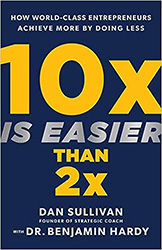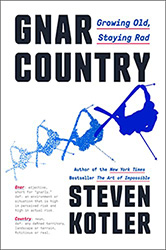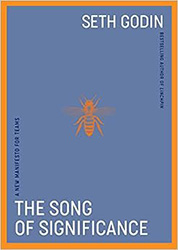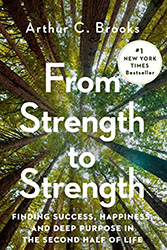4 (More) Books for Leaders
Latest Posts
- 2024 Reading List for Leaders
(posted: 07/01/2024)The right book can be a leadership game-changer.
- Coach's Notebook: Exec Presence for Leaders
(posted: 05/08/2024)As a leader your charisma is critical. Learn how to develop it!
- New Year's Resolutions vs New Chapters
(posted: 02/01/2024)Forget New Year's...Your new chapter can begin when you are ready!
Blog Archives
Kristi posts to her site about once a month, but frequently more often. She also appears as a featured contributer on select other sites. If you would like to be notified when new blogs are posted, please subscribe to our newsletter.
If you are interested in Kristi guest posting to your site feel free to contact us.
4 (More) Books for Leaders
(posted: September 7th, 2023)
How do we continue to find purpose in our work and our lives as we get older?
How can we, to borrow from Chip Conley, bring the wisdom of our years to bear as "modern elders"?
After this summer's Reading List you all asked for more book recommendations. This time around, I'd like you to join me on a journey of self-discovery, with the pages of the following four books as your compass, guiding you toward a more purposeful and satisfying second act of life.
It's never too late to redefine your path, and I hope these recommendations help you do just that.
[Any links in this post are provided as a courtesy to the reader. The reviews are my own opinions, all of the books were purchased, and I do not receive any kind of compensation if you click on a link!]

Leaders - 4 Reads for Finding Purpose & Meaning Later in Life
 1) 10x Is Easier Than 2x, by Dan Sullivan
1) 10x Is Easier Than 2x, by Dan Sullivan
"Growth happens as a result of many small steps. The key is to keep taking them." Dan Sullivan
Sullivan suggests that high-achievers should reach for the stars; basically, shoot to improve by 10 times rather than just a little bit, because the rewards are much greater. Going 10X means you’re living based on the most intrinsic and exciting future you can imagine. This 10X future becomes your filter for everything you do.
To be clear, the 10x that he refers to is a process, not an outcome. To make 10X possible, you must focus on expanding what Sullivan defines as your four most important freedoms - time, money, relationship, and purpose.
The idea is that only once you make your goal impossible will you stop operating based on your current assumptions and knowledge. At that point you'll be open to new ideas and you can see different paths and options that you've never considered. Seemingly impossible or massive goals are highly practical because they immediately separate what works from what won't.
When you make 10X your target, 80% of your current clients and relationships become impediments and 80% of your current activities, habits and mindsets as well.
I found that this tied back to Gnar Country (below) and Steve Kotler's jumps - you want to get into a flow and high performance state, and that requires:
- Clear and specific goals
- Immediate feedback
- A challenge that is above and outside your current skill set
Sullivan also focuses on identifying your "unique ability". The more you invest in your unique ability, the more 10X transformations you will make. Your unique ability is how you transform yourself again and again into the most unique, valuable and true form of yourself.
Ultimately, we need to trust our own inner voice and make our own decisions. If we are not innovating, breaking rules, and changing boundaries for what reality means, it is not our unique ability. It's not tied to any one activity, it is the approach we take when we are living at our best. Questions that I use with my coaching clients to help identify your unique ability:
- What do you truly want more than anything else?
- What would excite you more than anything else to be, do and have?
- What would you be and do if you were not afraid of what others thought or the repercussions?
- How would it feel to be more honest and real with yourself and the world?
He also touches on the need for resilience. Every experience has something to offer, every moment you learn and become better, not bitter as a result. Regularly reflecting on, appreciating, and measuring progress lightens the weight of 10X. Continuing to go 10X and transform your unique ability will simply enrich what you already have.
One of the things that sets this book apart from the rest is the emphasis on mindset and the power of consistent, deliberate action.
Research shows that confidence is the by product of past successes more than the cause of future successes. Being "in the gain" continually boosts your confidence by allowing you to reference progress. Then it boosts your imagination and motivates you to see and create more gains.
Here are additional questions I use with clients to measure progress, often resulting in some significant "a-hah" moments; spend a little time with them yourself and see what you learn:
- How have you grown as a person over the past two years?
- What are the biggest things you’ve learned in the past 12 months?
- What are ten important things you’ve accomplished in the past 12 months?
- What meaningful experiences have you had in the past 90 days?
- How are you clearer on your goals and vision than you were 90 days ago?
- What important progress have you made in the past seven days?
- What progress have you made in the past 24 hours?
As an example, my 80% has been letting go of people pleasing, saying YES to opportunities or situations I already know are not interesting to me. I have also let go of needing to always be productive. I have embraced recovery and relaxing and slow down time.
What is one action you can take today, that would have a big impact for you, one small thing move you toward your bigger future?
2) Gnar Country: Growing Old, Staying Rad, by Steve Kotler

I have to thank friend and colleague Bobbie LaPorte for recommending this one - I loved this book! Steve Kotler, a bestselling author and human performance expert, tests his knowledge and theories on his own aging body in a quest to become an expert skier at age fifty-three. [Gnar: adjective, short for "gnarly," def: any environment or situation that is high in perceived risk and high in actual risk.]
I'm not a skier, but with this book in my arsenal I just might get back on the surfboard at MEA in Baja [see photo, above]...stay tuned for that update!
This book is all about setting goals, grit, and the perseverance to keep going on the quest to meet those goals. Ask yourself, for peak performance, what "tricks" do you want to learn? Goal setting is critical for peak performance, along with the focus that puts you in the flow state.
Once we get beyond the aesthetics, getting old has its benefits. Over time, we accumulate decades of practice ignoring the voice in our head. Fear can steal decades from your life if you’re not paying attention.
Peak performance perspective isn't just about pleasure, it has to be about meaning as well.
If we can figure out the thing that makes us feel the very best on this planet, we can use this info to steer, to solve life's ultimate puzzle, the things that matter to us, our yes's and no's. These determine the quality of our days. Filters like these allow us to avoid a considerable amount of decision fatigue and truly align our lives with the 3 pillars of well-being: passion, purpose, and meaning.
Group flow: When the author skied the icy line with his friend, Ryan, to create group flow they relied on shared risk, shared goals, good communication, equal participation, and close listening.
This translates into the rest of life! Group flow triggers like the above can be used in a business meeting or when you are trying to talk to your kids or any other place where two or more people get together. Flow follows focus and the state only arises when we focus all our attention on the here and now. With groups, it's a shared version of attention where two or more people become absorbed in the same experience.
Never waste a flow state! Once you are in the flow, the euphoria, the deep sense of meaning, the turbo boost to purpose, that’s the real point. Injuries heal. An increased sense of meaning and purpose, that lasts a lifetime.
I also thought it was important to note how much our physical bodies can tell us about our mental/emotional state. We think with our bodies as well as our brains, and often times our body knows more than our brain. Yet learning to listen to those signals can take practice.
And, like 10x, above, the little wins, the small shifts in perspective, are hugely important and add up to more than you might expect. Plus, a positive mindset toward aging, viewing the second half of our lives as a time of exciting possibility, prevents cognitive decline, preserves physical prowess and extends longevity.
How do you want to spend your later years? The good news is, you can pursue peak performance with the right mindset!
BONUS! The author, Steve Kotler is doing a workshop WITH Chip at the Santa Fe campus of the Modern Elder Academy! It's rare to catch one of these workhsops with Chip as one of the leaders/teachers. Check out Mastery Week: Finding Flow in Midlife and Beyond with Steve Kotler.
 3) Song of Significance, by Seth Godin
3) Song of Significance, by Seth Godin
A theme that appears throughout "The Song of Significance" is that people want to do work that matters.
Leaders of organizations create value when they build a culture where people make a difference.
As Seth Godin puts it, "Humans aren’t a resource. They are the point."
Song of Significance is filled with 144 practical tips!
Here, a few of my favorites:
- How do I get people to do what I want? Perhaps the better question is: how do I create the conditions for other people to do work that matters. Leadership is the art of creating something significant, "how do I create the conditions where the team can make the impact it desires?"
-> Becoming significant means making a change happen: impacting the people or the world around us so they are different than if we had never been there. But to create change involves risk, the risk of living in possibility and the threat of failure, or success.
-> The leader understands that a commitment to significance is a generous act, but it also brings apparent risk and real fear to everyone involved. Fear that's wily and subtle, clever and persistent.
-> When we embrace the mutual commitments of significance, we create the conditions for a shared understanding that our work, our actual work is to dance with the fear. And dancing with fear requires significance, tension, and the belief that we're doing something that matters. - Courage isn't the absence of fear; it's a willingness to do things that are so important they are worth doing even (especially) when we're feeling the fear. Vulnerability in conversation is the power of speaking about what you see and believe, even when you're afraid. That is the opposite of weakness.
- When we rebuild work around significance, we change the promise. We require bosses to produce a different set of rules, and we invite workers to bring different expectations, energy and commitments to their jobs.
We're here to make change happen, name the change, be clear about who and why and how.
I'd love to hear from you which of Seth's tips, points, or suggestions, resonates most!
4) From Strength to Strength: Finding Success, Happiness, and Deep Purpose in the Second Half of Life, by Arthur Brooks

Success doesn't always equal happiness, and in fact, it can lead to a greater sense of disappointment and loss in later years when your career starts to wind down. What can we do, starting now, to make our "second act", our later years, a time of happiness, purpose, and success?
Arthur Brooks, the Atlantic's happiness columnist, shows us that by refocusing on certain priorities and habits that anyone can learn, such as deep wisdom, detachment from empty rewards, connection and service to others, and spiritual progress, we can set ourselves up for increased happiness.
Studies show that people who have chased power and achievement in their professional lives tend to be unhappier after retirement than people who did not.
The agony of decline is directly related to prestige previously achieved and our emotional attachment to that prestige. If you have low expectations and never do much, you probably will not suffer much once you start declining. But if you attain excellence and are deeply invested in it, you can feel pretty irrelevant when you fall from those heights and that is agony.
However, instead of denying the change in your abilities, you can make the change itself a source of strength; find a new kind of success, a deeper form of happiness and in the process true meaning in life, maybe for the first time. You will need to let go of some things that you worked hard for but that are now holding you back.
When you are young you have raw smarts, when you are old you have wisdom. When you are young you can generate lots of facts, when you are old, you know what they mean and how to use them.
This is me with coaching: there always exists the ability to redesign your career, less on innovation and more on instruction thus playing to your strengths.
- This is where learning and thought create a worldview that can enrich others and our natural ability is counsel, mentoring, advising and teaching others.
- Devote the back half of your life to serving others with your wisdom. Get old sharing the things you believe are most important. Excellence is always its own reward, and this is how you can be most excellent as you age.
People who choose being special over happy are addicts. What workaholics truly crave isn’t work, per se, it is success. Success, the fruit of excellence, becomes an addiction; all because of pride. Success addicts frequently have a lot of fear too, fear of failure. Many success addicts confess that they feel like losers when they see someone else who is yet more successful. Teddy Roosevelt called social comparison the “thief of joy” and researchers have found that social comparison lowers our happiness. But you hardly need a study to tell you this, just spend a few hours on Instagram and see how bad you feel about yourself!
The satisfaction equation:
- Failure = having less
- Satisfaction = what you have ÷ what you want
Satisfaction comes not from chasing bigger and bigger things, but paying attention to smaller and smaller things.
Live in such a way that anyone can die without you having anything to regret. Scarcity makes everything dearer to us, remembering that life won’t last forever makes us enjoy it all the more today.
Good relationships keep us happier and healthier. 2018 study found 46% of Americans felt lonely and 43% felt their relationships were not meaningful. Per Harvard Business Review, half of CEOs experience loneliness on the job and most of them feel this hinders their performance.
So, nurture your close relationships, and find work you love. Seek work that is a balance of enjoyable and meaningful -- the nexus of enjoyable and meaningful is interesting. Something that truly interests you is intensely pleasurable, it also must have meaning in order to hold your interest, Ask “is this work deeply interesting to me?”
Letting go of what you have, what you’ve built, a professional life that answers the questions, “who am I?” is a professional death with a rebirth that is uncertain. You are looking out over a precipice, unsure whether what awaits will bring net pleasure or pain or most likely both.
But you know what you have to do, don’t think dude, just jump!
A 'Goodie' For YOU!
If you made it all the way to this point, I've got something special for you! I'd like to offer you a free coaching session. Not a consultation, but an actual coaching session.
Are you ready? Reach out to me and we will put your session on the calendar. I'm so excited to share this experience with you!!
- Have you thought about your purpose and passion as you move into midlife and beyond?
- If you had to choose just one of these books to read, which would it be and why?
- What title would you add to the list?
Sign Up for our newsletter and never miss another post.
